
|
SPOTLIGHT ON THE DELTA RHYTHM BOYS -
PART THREE OF THREE (SEGMENT "A")
|
"She Believed A Gypsy"/ |
"Let Me Off Uptown"/ |
"Mad About Her, Sad Without Her, |
"Praise The Lord |
"Do Nothin' Till You Hear From Me"/ |
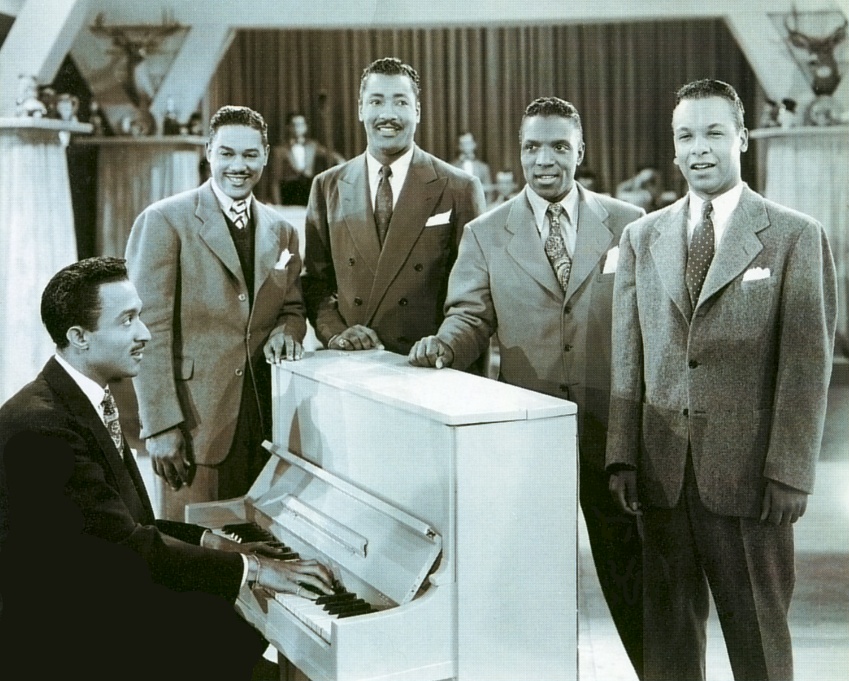
|

|
SPOTLIGHT ON THE DELTA RHYTHM BOYS -
PART THREE OF THREE (SEGMENT "A")
|
"She Believed A Gypsy"/ |
"Let Me Off Uptown"/ |
"Mad About Her, Sad Without Her, |
"Praise The Lord |
"Do Nothin' Till You Hear From Me"/ |

|
|
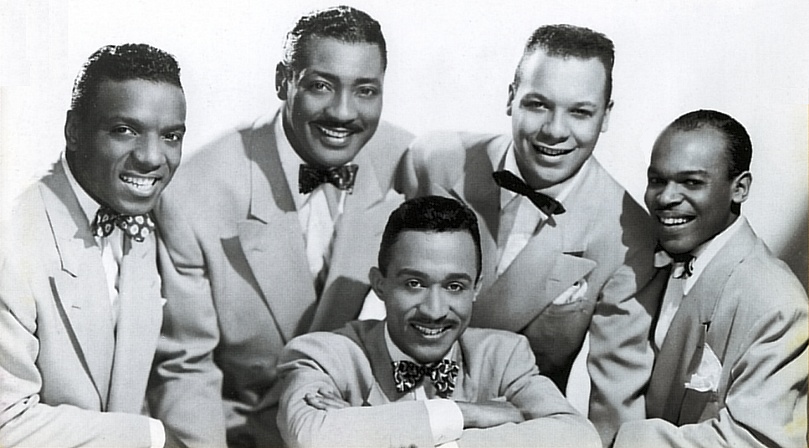
|
Above: The Delta Rhythm Boys (L-R) Traverse Crawford, Lee Gaines, Rene DeKnight (in front), Kelsey Pharr, and Carl Jones.
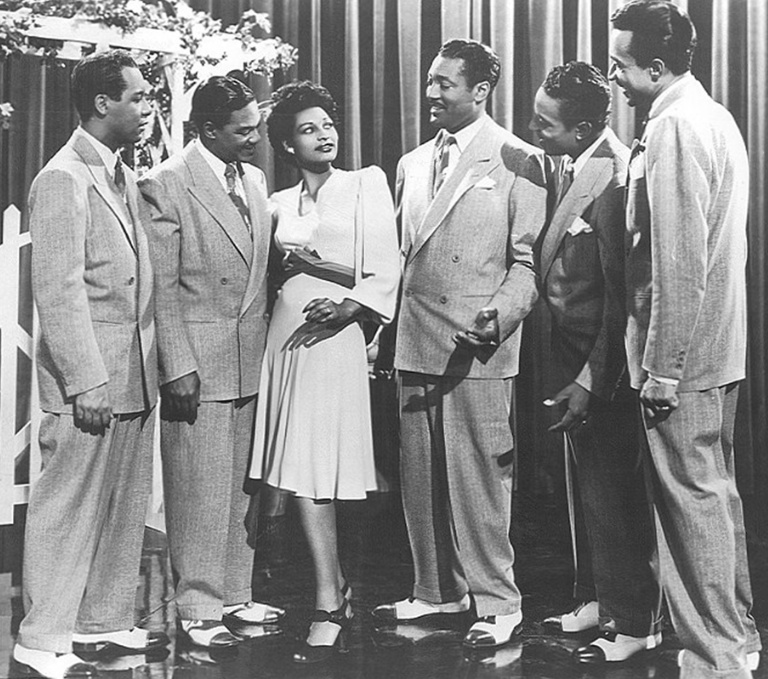
|
Above: The Delta Rhythm Boys with an unknown woman. Phil Beauchamp adds: This is from the 1945 Universal film "Easy To Look At" in which they sing to that woman "Is You Is, Or Is You Ain't My Baby."
Steve Fernie adds: The "unknown woman" in the above photo is Suzette Johnson. I have another publicity photo from the film that credits her in the caption on the back.
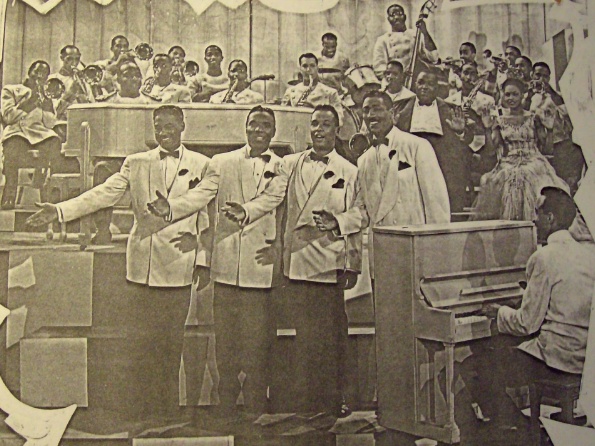
|
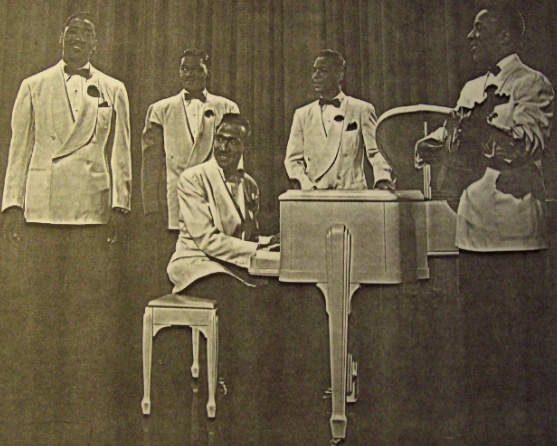
|
Above: The Delta Rhythm Boys in the movies. From Phil Beauchamp: The Delta Rhythm Boys had a seven year contract with Universal Pictures which was optional after the first year. Universal dropped them because they refused to do films wth stereotype roles. All in all, they appeared in 18 features and shorts for Universal Pictures. The above left photo is from the 1943 Universal film "Crazy House" singing "A Pocket Full Of Pennies." In the background is the Count Basie Orchestra. The above right photo is from the 1945 Universal short "Swing High Swing Sweet" singing "What A Difference A Day Makes."
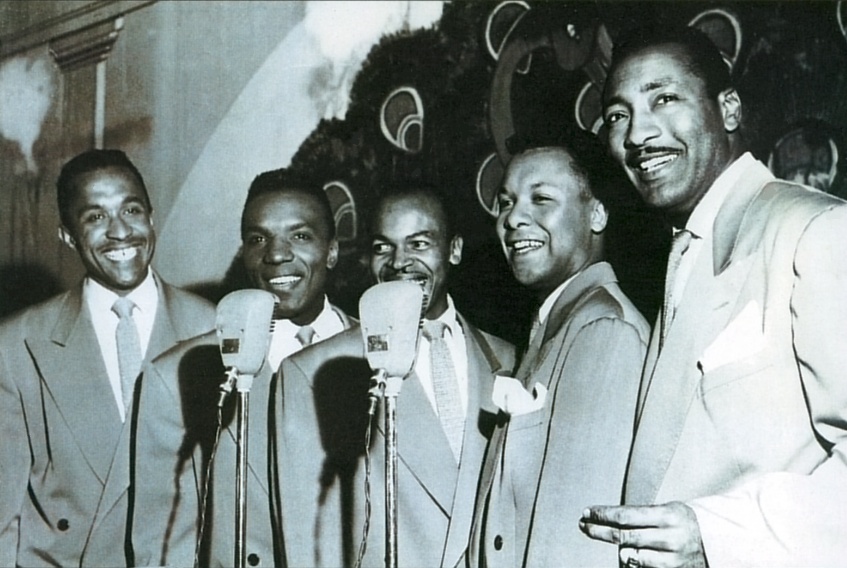
|
Above: The Delta Rhythm Boys (L-R) Rene DeKnight, Traverse Crawford, Carl Jones, Kelsey Pharr, and Lee Gaines.
DELTA RHYTHM BOYS PHOTOS.... |
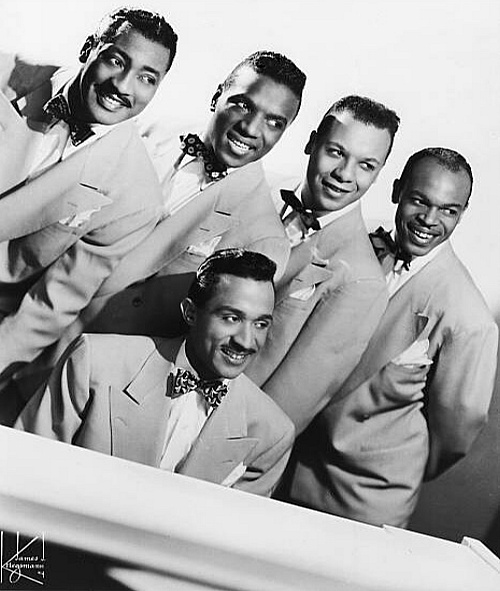
|
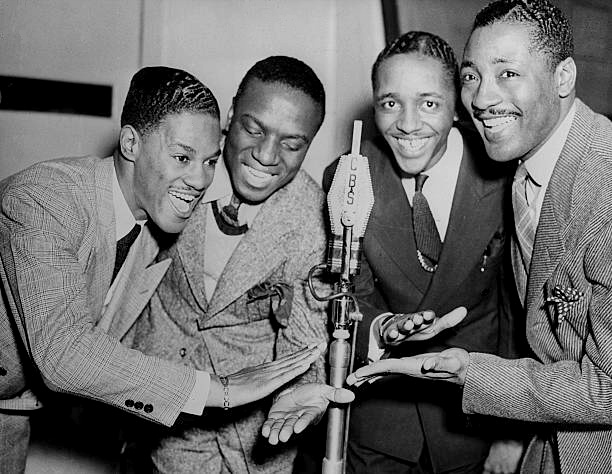
|
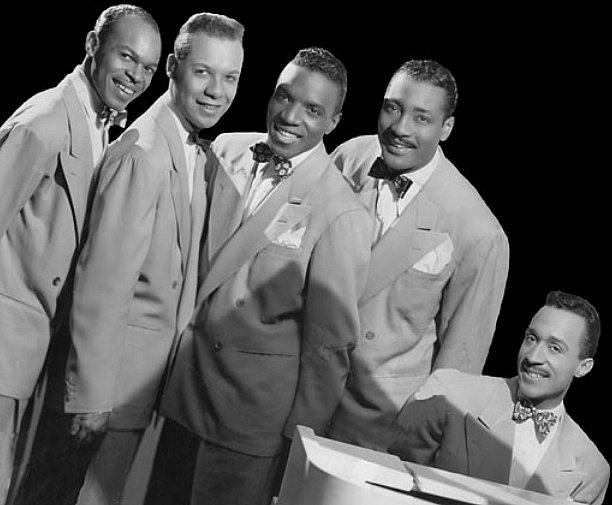
|
ARTICLES AND BLURBS....
SHAMOKIN NEWS DISPATCH, November 8, 1943: DELTA RHYTHM BOYS
The Delta Rhythm Boys, vocal quartet of stage, screen and radio, are heard to advantage in Universal's "Hi'Ya Sailor" now at the Capitol Theatre. Together since they met as music students at Dillard University in New Orleans in 1935, the team consists of Clinton Holland, first tenor; Traverse Crawford, second tenor; Kelsey Pharr, baritone; and Lee Gaines, bass, with Rene DeKnight at the piano.After cutting their musical teeth, so to speak, as the university quartet, the boys went into radio and concert work. A successful excursion to South America then followed, after which they returned to New York, to appear at Le Ruban Bleu supper club. They have been featured in three Broadway shows: "Sing Out The News," "Hellzapoppin," and "The Hot Mikado," and in the Bill Robinson show in Los Angeles, "Born Happy." Their experience includes two seasons on CBS....
THE BILLBOARD 1944 MUSIC YEARBOOK: DELTA RHYTHM BOYS
The Delta Rhythm Boys are currently on a nationwide tour which started in Los Angeles recently with their appearance at the Orpheum Theater and followed by a hold-over run in the Ramona Room of the Hotel Last Frontier, Las Vegas. This singing group features popular tunes as well as novelties and spirituals. Singing in the group are Kelsey Pharr, Traverse Crawford, Lee Gaines, and Carl Jones. Rene DeKnight is their pianist-accompanist and arranger.They have recorded Do Nothing Till You Hear From Me, and Travelin' Light and are soon to be heard on Just A-Sittin' And A-Rockin'. They record for Decca. In pictures they recently completed a long-term contract at Universal and can currently be seen in Follow The Boys, Night Life and Reckless Age. In radio they have the distinction of appearing on California Melodies over Don Lee-Mutual Network for 13 weeks. Group has also appeared in many night clubs, including Slapsy Maxie's in Los Angeles.
The Delta Rhythm Boys were originally known as the Rhythm Boys, a name they took over soon after starting out professionally from Dillard College in New Orleans. Under the management of Music Corporation Of America, their personal manager is Paul Kapp.
VIDEO (MP4)....
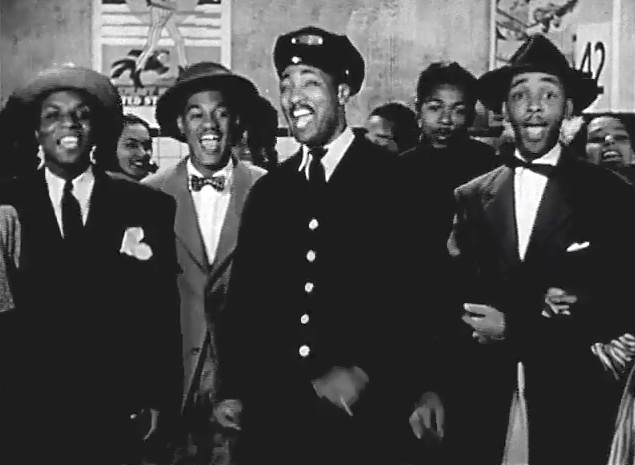
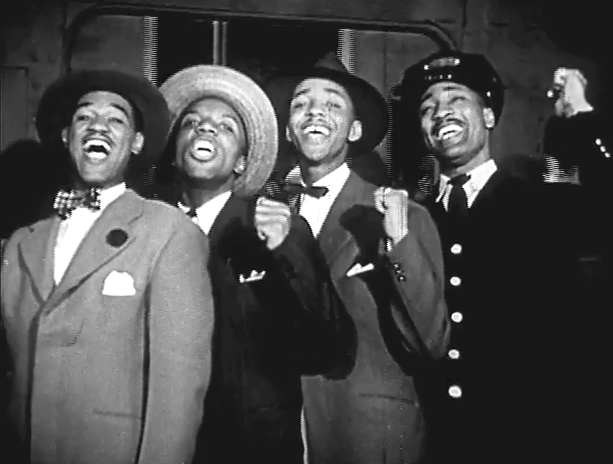
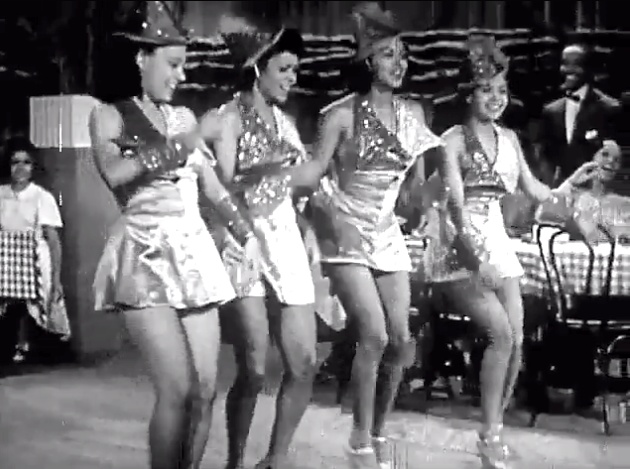
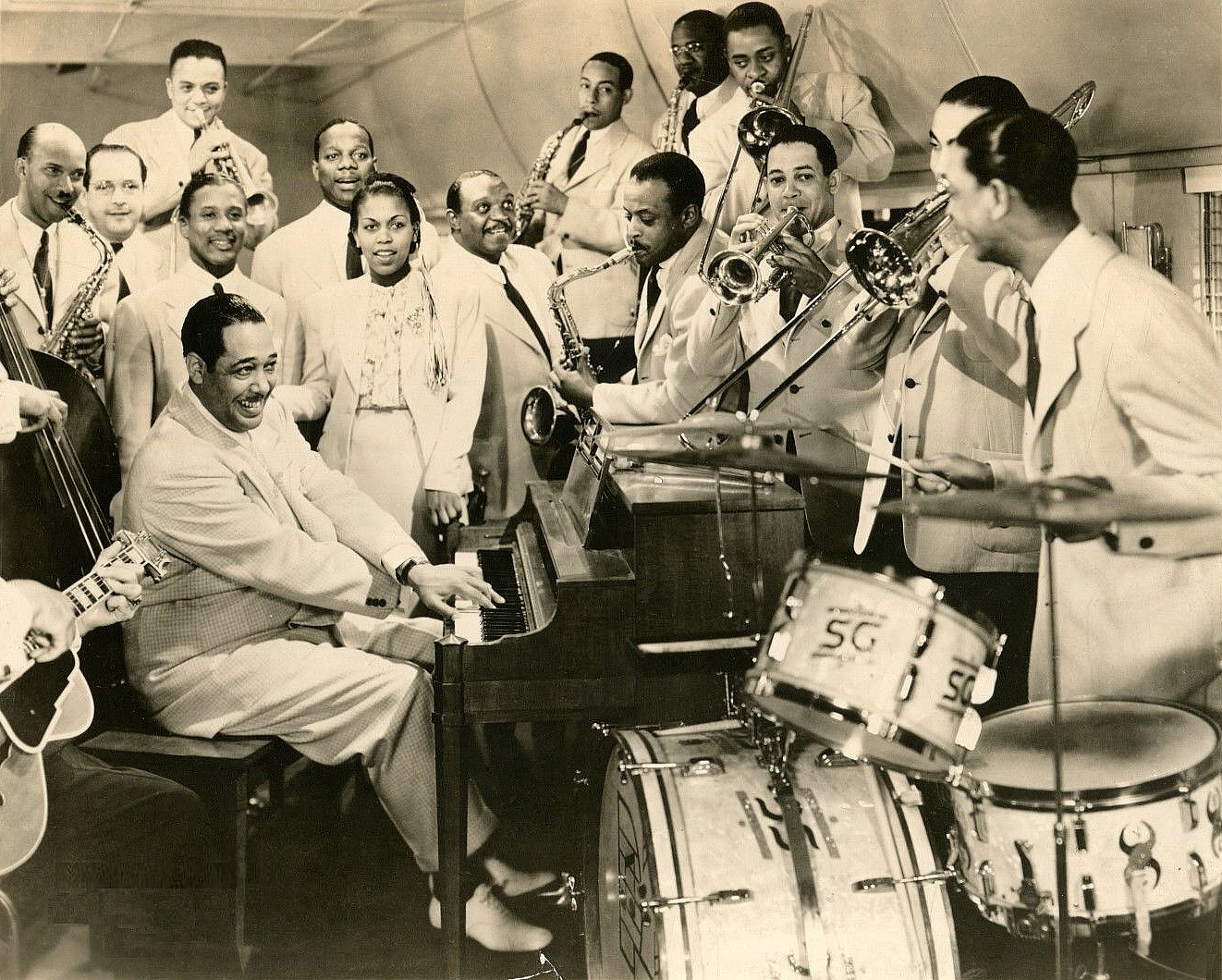
ABOVE:
The three movie stills are from the 1941 Soundie "Take The 'A' Train" with The Delta Rhythm Boys singing the title song.THE BILLBOARD, November 8, 1941:
Program 1038 Produced by Minoco Productions. Released by Soundies Distributing Corporation of America, Inc.
....THE DELTA RHYTHM BOYS, strong Negro harmony quartet, interpret Take The "A" Train effectively. Action takes place on a New York subway ride into Harlem and finally into a lively cafe where a pretty copper-colored line presents a good rhythm routine.Listen to "Take The "A" Train" - The Delta Rhythm Boys - Minoco Soundie - 1941 using Windows Media Player.
Watch the VIDEO of The Delta Rhythm Boys singing "Take The "A" Train" in a Minoco Soundie in MP4 format.
(Will open in a new window)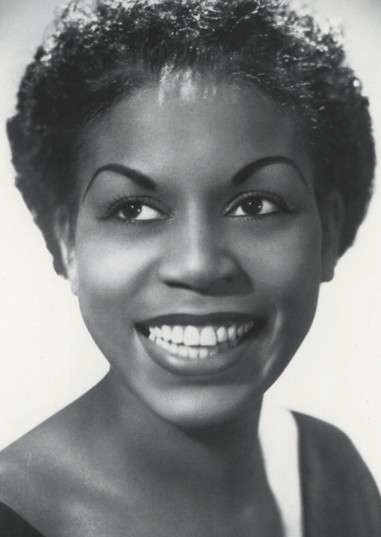
AT LEFT:
Duke Ellington And His Orchestra, with featured vocalist Betty Roche, in a still shot taken from his "Take The 'A' Train" short, which was included in the 1943 movie "Reveille With Beverly". Betty is backed vocally by members of the orchestra on this song. Note that Miss Roche dances "the twist" in this video, well before its national fame."Duke Ellington And His Famous Orchestra" recorded an instrumental version of this song on February 15, 1941, which was released on Victor 27380-A. Also note that the lead-in to the video shows a Victor record spinning on the turntable.
Listen to "Take The "A" Train" - Duke Ellington Orchestra - "Reveille With Beverly" Movie - 1943 using Windows Media Player.
Watch the VIDEO of Duke Ellington Orchestra performing "Take The "A" Train" in MP4 format.
(Will open in a new window)
EXTRA AUDIO #1 (Windows Media Player):AFRS 061 JUBILEE RECORDED ON TRANSCRIPTION DISC ON JANUARY 17, 1944
This thirty minute musical show was hosted by Ernie Whitman and featured the C. P. Johnson Band. The AFRS transcription disc was produced to entertain armed forces personnel and includes two selections by The Delta Rhythm Boys. Both are Johnny Mercer compositions. The first, "That Old Black Magic", is sung by them and on the second, "Knock Me A Kiss", they back up Johnny Mercer himself.
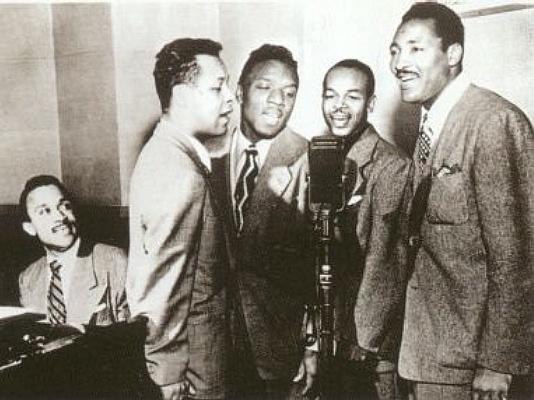
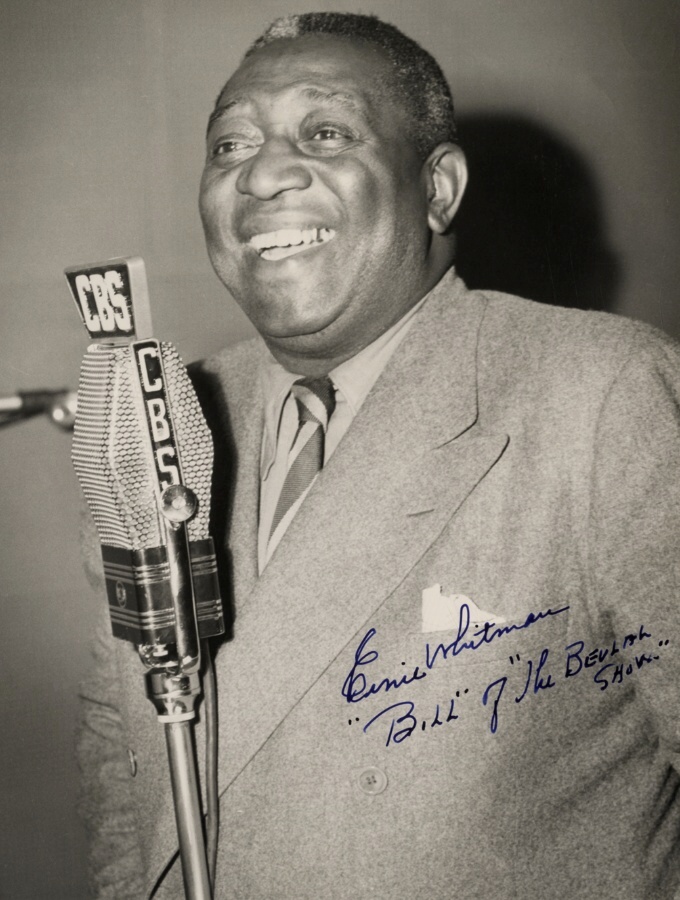
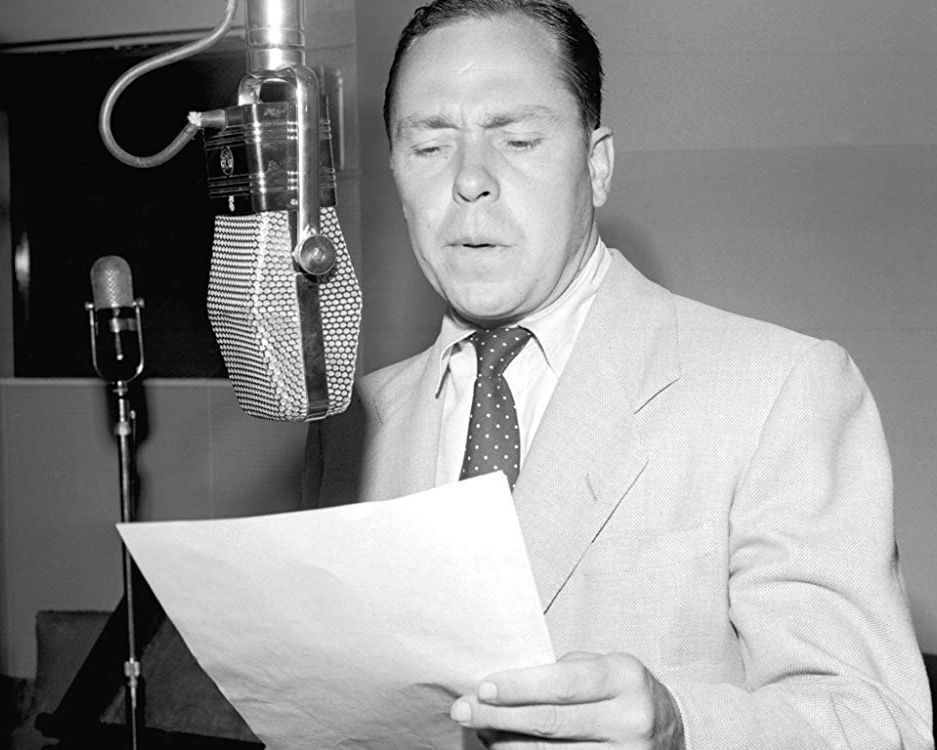
ABOVE LEFT: The Delta Rhythm Boys (L-R) Rene DeKnight (piano), Kelsey Pharr, Traverse Crawford, Carl Jones, and Lee Gaines. ABOVE MIDDLE: Ernie Whitman, M.C. of the AFRS 061 Jubilee transcription disc show. Inscription on photo is "Bill" of "The Beulah Show." Whitman played Beulah's boy friend, "Bill Jackson", on CBS Radio's "The Beulah Show" in 1946 and 1947.
ABOVE RIGHT: Johnny Mercer, featured guest on the AFRS 061 Jubilee show.
LISTEN: "That Old Black Magic/Knock Me A Kiss" - The Delta Rhythm Boys/Johnny Mercer And The Delta Rhythm Boys - AFRS 061 Jubilee - 1944.
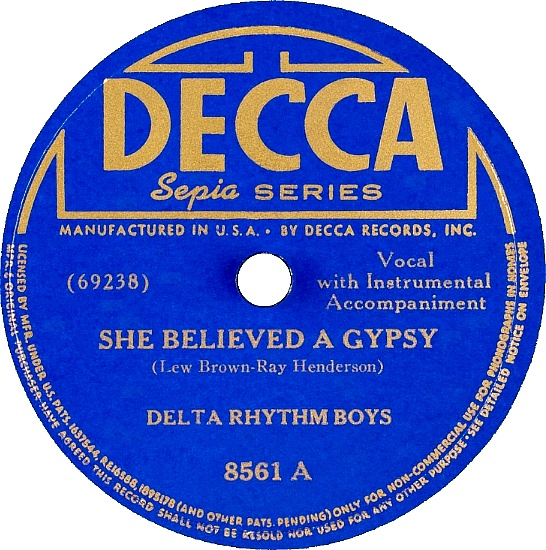
|
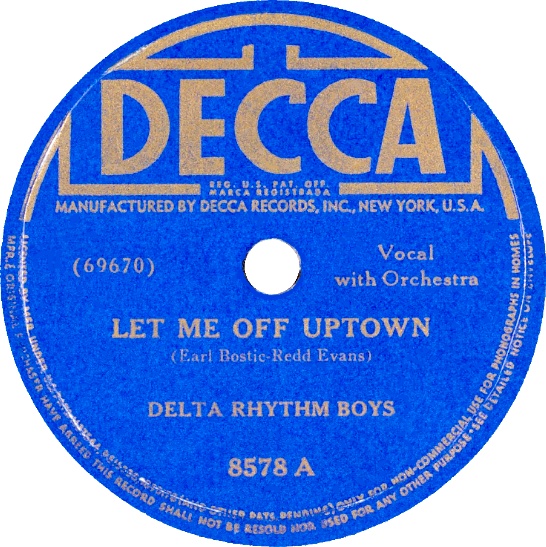
|
Above Left: Label image of Decca 8561 recorded on May 22, 1941 and released in July 1941. The "B" side was recorded on June 13, 1941.Above Right: Label image of Decca 8578 recorded on August 21, 1941 and released in September 1941.
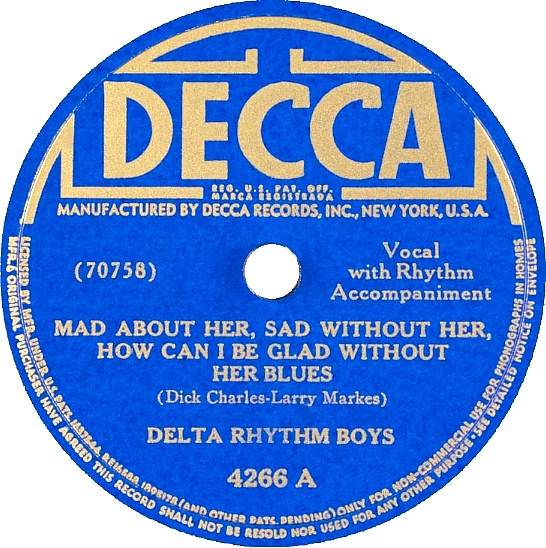
|
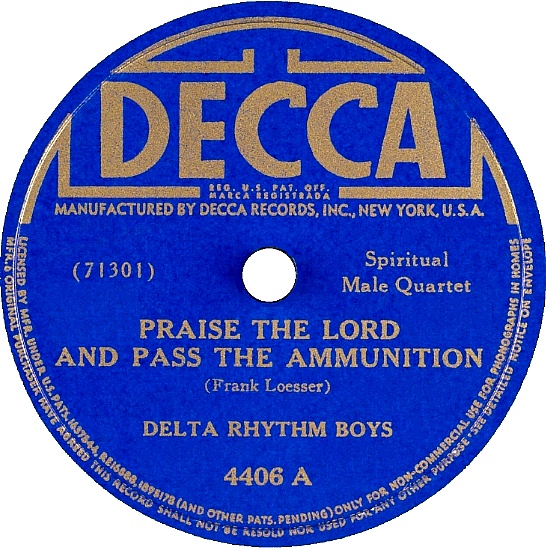
|
Above Left: Label image of Decca 4266 recorded on May 19, 1942 and released in June 1942. |
EXTRA AUDIO #2 (Windows Media Player):
[Audio restoration by Dave Saviet.]PRAISE THE LORD AND PASS THE AMMUNITION
"Praise the Lord and Pass the Ammunition" is an American patriotic song by Frank Loesser and published as sheet music in 1942 by Famous Music Corp. The song was a response to the attack on Pearl Harbor that marked the United States' involvement in World War II. The song describes a chaplain ("sky pilot") being with some fighting men who are under attack from an enemy. He is asked to say a prayer for the men who were engaged in firing at the oncoming planes. The chaplain puts down his Bible, mans one of the ship's gun turrets and begins firing back, saying, "Praise the Lord and pass the ammunition". [From Wikipedia]
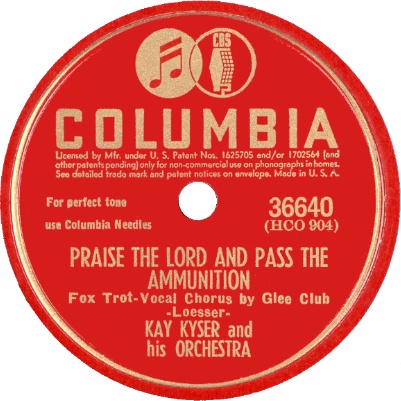
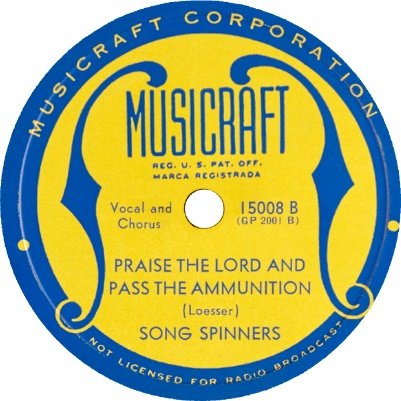
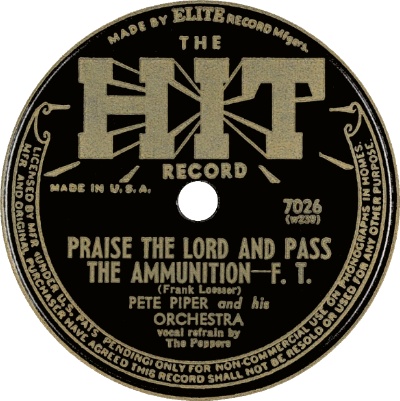
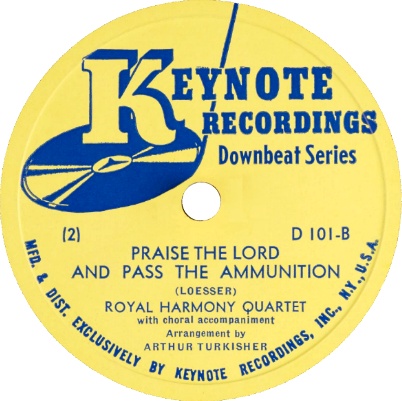
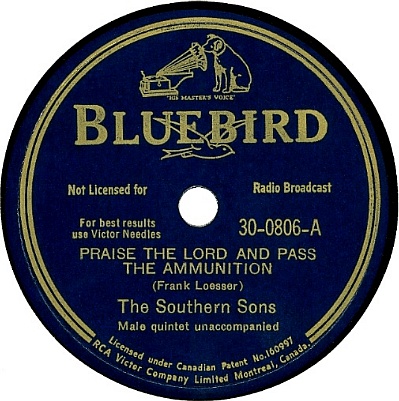
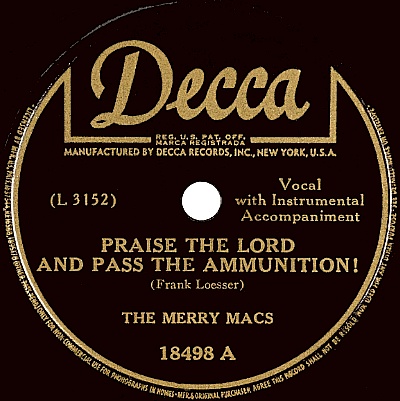
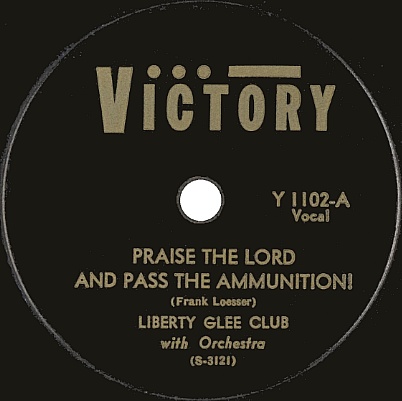
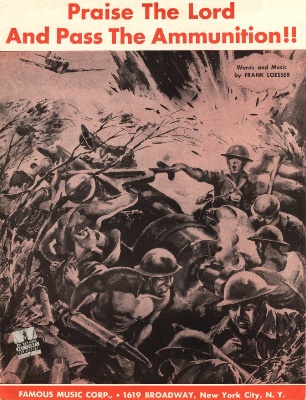
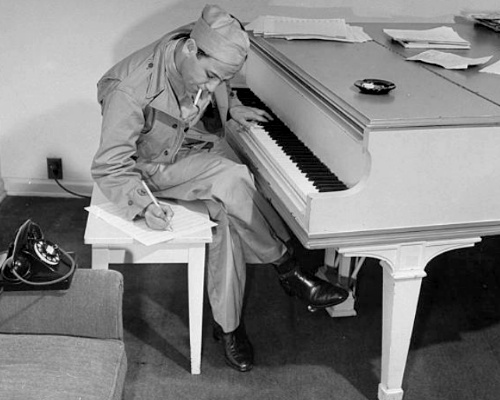
ABOVE RIGHT: Frank Loesser, at piano, working on his composition "Praise The Lord And Pass The Ammunition".
LISTEN:
1. "Praise The Lord And Pass The Ammunition" - Kay Kyser Orchestra (Glee Club) - Columbia 36640 - 1942.
2. "Praise The Lord And Pass The Ammunition" - The Song Spinners - Musicraft 15008 B - 1942.
3. "Praise The Lord And Pass The Ammunition" - Pete Piper Orchestra (The Peppers) - Hit 7026 - 1942.
4. "Praise The Lord And Pass The Ammunition" - Royal Harmony Quartet - Keynote D 101-B - 1942.
5. "Praise The Lord And Pass The Ammunition" - The Southern Sons - Bluebird 30-0806-A - 1942.
6. "Praise The Lord And Pass The Ammunition" - The Merry Macs - Decca 18498 A - 1942.
7. "Praise The Lord And Pass The Ammunition" - Liberty Glee Club - Victory Y 1102-A - 1942.
ALL SEVEN played in sequence.
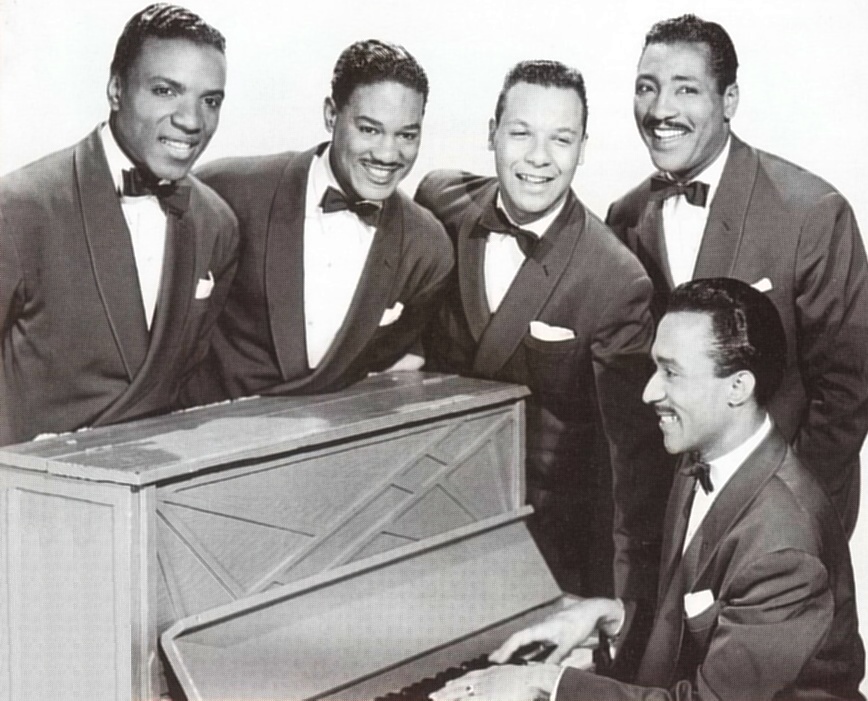
|
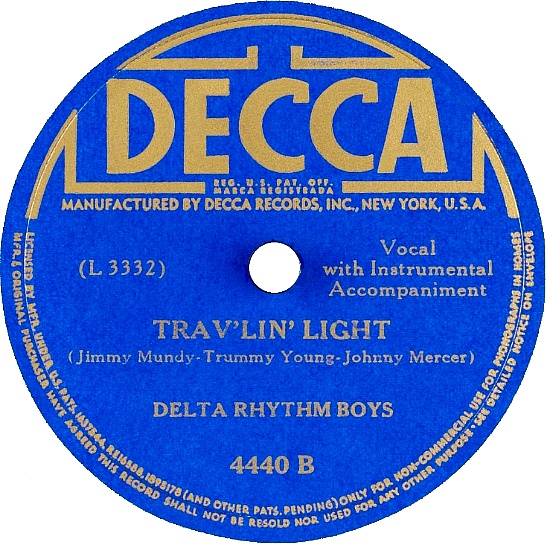
|
Above Left: The Delta Rhythm Boys.Above Right: Label image of Decca 4440 recorded on February 25, 1944 and released in April 1944. The Delta Rhythm Boys began recording for the Decca label in 1940 with releases from 1941 through 1946, and then again in 1954/1955. In between, they recorded for RCA Victor, with releases from 1947 through 1953. There were also several releases on Atlantic in 1949/1950 (one as by The Four Sharps), with some providing vocal backing for Ruth Brown. They also had three releases on Mercury recorded in 1950/1951 that were not released until 1952.
NOTE: Most discographical information provided at this website is from Ferdie Gonzalez' Disco-File.
Listen to this week's selections featuring The Delta Rhythm Boys on Decca from 1941/1944 using Windows Media Player:
[Audio restoration by Dave Saviet.]
[To download audio files, right-click on song title link and then select "Save link (target) as..."]
Click HERE for SPOTLIGHT ON THE DELTA RHYTHM BOYS - PART ONE (FEATURING MILDRED BAILEY).
Click HERE for SPOTLIGHT ON THE DELTA RHYTHM BOYS - PART TWO (FEATURING ELLA FITZGERALD).
Click HERE for SPOTLIGHT ON THE DELTA RHYTHM BOYS - PART FOUR (SEGMENT "B").
(Above links will open in a separate window)